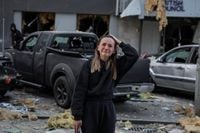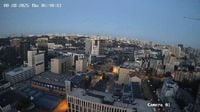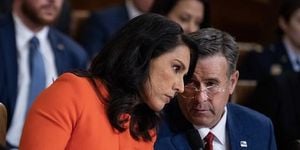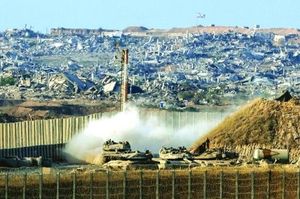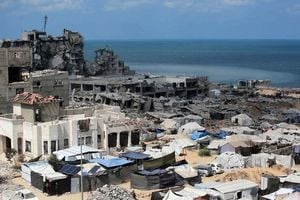In the early hours before August 28, 2025, the city of Kyiv was rocked by one of the most devastating assaults since the start of Russia's full-scale invasion of Ukraine. According to Ukrainian officials and multiple international sources, Russia unleashed a barrage of almost 600 drones and more than 30 ballistic and cruise missiles upon the Ukrainian capital, marking what experts have called the second-largest strike of the war. The human cost was immediate and heartbreaking: at least 18 people, including four children, lost their lives in the attacks, while dozens more were injured. The force of the strikes destroyed a five-storey residential building and left a trail of devastation across the city.
Among the buildings severely damaged was the office of the British Council, an organization dedicated to fostering cultural and educational ties between the UK and other countries. In a statement reported by BBC, the British Council confirmed, "Following last night's attack on Kyiv, our British Council office has been severely damaged and will be closed to visitors until further notice. While there may be some delays in our responses, our work with our Ukrainian partners in education and culture continues." A guard working at the office was injured and, according to the organization, is now in stable condition in hospital.
The EU Delegation office in Kyiv was also hit in the overnight barrage, suffering damage to its building. Fortunately, no staff were injured in this attack. The European Union’s foreign policy chief, Kaja Kallas, was quick to condemn the strike, stating that it showed Russia had made a "deliberate choice to escalate and mock the peace efforts." The EU announced it would summon its Russian envoy in response to the attack on its diplomatic premises, joining the United Kingdom in a coordinated diplomatic protest.
The United Kingdom’s response was swift and resolute. Russia's ambassador to the UK, Andrei Kelin, was summoned to the Foreign Office in London on August 28, 2025, where he met with officials—but notably, not ministers. Foreign Secretary David Lammy confirmed the move on X (formerly Twitter), writing, "The killing and destruction must stop." Lammy further condemned the attacks, emphasizing, "Putin strikes last night killed civilians, destroyed homes and damaged buildings, including the British Council and EU Delegation in Kyiv."
Prime Minister Sir Keir Starmer was equally forceful in his criticism. He accused Russia of "sabotaging hopes of peace" with what he called "senseless" attacks. His remarks echoed a growing sense of frustration among Western leaders, who see these repeated assaults as deliberate attempts to undermine any possibility of a negotiated settlement to the conflict.
For the people of Kyiv, the latest attack was a chilling reminder of the war’s relentless toll. The Ukrainian military described the operation as the first combined drone and missile attack on the capital in weeks, underscoring the unpredictable and escalating nature of Russia’s campaign. The destruction of civilian infrastructure—homes, cultural institutions, and diplomatic missions—has become a grim hallmark of the war, drawing widespread condemnation from the international community.
Orysia Lutsevych, deputy director of the Russia and Eurasia programme at Chatham House, offered a strategic perspective in an interview with Sky News. She noted, "The pattern continues," referencing Russia’s repeated use of large-scale strikes to pressure Ukraine and its allies. Lutsevych argued that Europe must fundamentally rethink its approach to the conflict: "Europe has to treat Ukraine's frontline as its own frontline, as its own first line of defence against Russian threat." She urged European nations to "frontload more equipment from its own stockpiles because right now, Ukraine is the first line of defence, and while Europe is rearming and backfilling its stock, it can still supply more to Ukraine."
Lutsevych also called for a tougher economic response, emphasizing that Europe should be "more forceful" in imposing sanctions on Russia. Her comments reflect a growing consensus among Western policy experts that incremental measures are no longer sufficient in the face of Russia's escalating aggression.
The attacks on diplomatic and cultural institutions, such as the British Council and the EU Delegation, have added a new dimension to the crisis. These organizations are symbols of international cooperation and dialogue, and their targeting is widely seen as a calculated move to intimidate Ukraine’s partners and disrupt the flow of humanitarian and educational support. The British Council, while acknowledging operational delays, pledged to continue its work with Ukrainian partners, underscoring the resilience and determination of those affected by the violence.
International reactions have been marked by a mix of outrage and resolve. The coordinated decision by both the UK and the EU to summon Russian diplomats sends a strong message of diplomatic unity, even as Western leaders grapple with the limits of their influence. The summoning of Ambassador Kelin and his EU counterpart is largely symbolic, but it signals a deepening rift between Russia and the West and a hardening of positions as the war grinds on.
In the broader geopolitical context, these events have reignited debates about Europe’s role in the conflict. Many analysts argue that the continent cannot afford to view the war as a distant problem. As Lutsevych put it, "Europe has to treat Ukraine's frontline as its own frontline." This perspective is gaining traction as Russian attacks grow in scale and audacity, threatening not only Ukraine’s sovereignty but also the stability of the European security order.
For the families of those killed and injured in Kyiv, the diplomatic maneuvers and policy debates may seem distant. Yet, the international response—condemnation, support, and calls for accountability—offers some measure of solidarity to a nation under siege. The damage to the British Council and EU Delegation buildings, while material, also serves as a stark reminder of the broader stakes in this conflict: the defense of international norms, the protection of civilians, and the pursuit of a just peace.
As Kyiv begins the arduous process of recovery and mourning, the world watches closely. The latest wave of attacks has not only claimed lives and destroyed buildings but has also deepened the resolve of Ukraine’s allies to stand firm against aggression. Whether these events will mark a turning point in the international response remains to be seen. For now, the message from London, Brussels, and beyond is clear: the killing and destruction must stop, and the quest for peace must continue—however distant it may seem.
